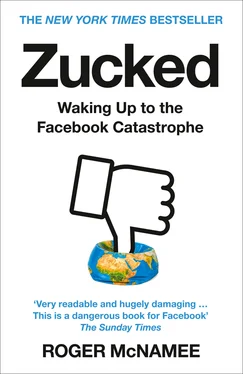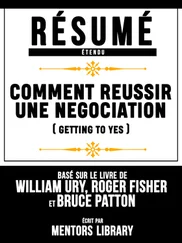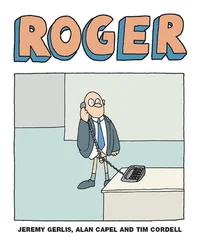In the fall of 2007, Zuck told me he wanted to hire someone to build Facebook’s monetization. I asked if he was willing to bring in a strong number two, someone who could be a chief operating officer or president. He said yes. I did not say anything, but a name sprang to mind immediately: Sheryl Sandberg. Sheryl had been chief of staff to Secretary of the Treasury Larry Summers during Bill Clinton’s second term. In that job, she had partnered with Bono on the singer’s successful campaign to spur the world’s leading economies to forgive billions in debt owed by countries in the developing world. Together, Bono and Sheryl helped many emerging countries to reenergize their economies, which turned out to be a good deal for everyone involved. Sheryl introduced Bono to me, which eventually led the two of us to collaborate on Elevation Partners. Sheryl came to Silicon Valley in early 2001 and hung out in my office for a few weeks. We talked to Sheryl about joining Integral, but my partner John Powell had a better idea. John and I were both convinced that Sheryl would be hugely successful in Silicon Valley, but John pointed out that there were much bigger opportunities than Integral. He thought the right place for Sheryl was Google and shared that view with John Doerr, who was a member of Google’s board of directors. Sheryl took a job at Google to help build AdWords, the product that links ads to search results.
AdWords is arguably the most successful advertising product in history, and Sheryl was one of the people who made that happen. Based on what I knew about Sheryl, her success came as no surprise. One day in 2007, Sheryl came by to tell me she had been offered a leadership position at The Washington Post . She asked me what I thought. I suggested that she consider Facebook instead. Thanks to Watergate and the Pentagon Papers, the Post was iconic, but being a newspaper, it did not have a workable plan to avoid business model damage from the internet. Facebook seemed like a much better match for Sheryl than the Post , and she seemed like the best possible partner for Zuck and Facebook. Sheryl told me she had once met Zuck at a party, but did not know him and worried that they might not be a good fit. I encouraged Sheryl to get to know Zuck and see where things went. After my first conversation with Sheryl, I called Zuck and told him I thought Sheryl would be the best person to build Facebook’s advertising business. Zuck worried that advertising on Facebook would not look like Google’s AdWords—which was true—but I countered that building AdWords might be the best preparation for creating a scalable advertising model on Facebook. It took several separate conversations with Zuck and Sheryl to get them to meet, but once they got together, they immediately found common ground. Sheryl joined the company in March 2008. Looking at a March 2008 Wall Street Journal article on Sheryl’s hire and Zuck’s other efforts to stabilize the company by accepting help from more experienced peers, I’m reminded that Facebook’s current status as a multibillion-dollar company seemed far from inevitable in those days. The article highlighted the company’s image problems and mentioned Zuck complaining to me about the difficulties of being a CEO. Still, growth accelerated.
The underlying technology of the disastrous Beacon project resurfaced in late 2008 as Facebook Connect, a product that allowed users to sign into third-party sites with their Facebook credentials. News of hacks and identity theft had created pressure for stronger passwords, which users struggled to manage. The value of Connect was that it enabled people to memorize a single, strong Facebook password for access to thousands of sites. Users loved Connect for its convenience, but it is not obvious that they understood that it enabled Facebook to track them in many places around the web. With the benefit of hindsight, we can see the costs that accompanied the convenience of Connect. I tried Connect on a few news sites, but soon abandoned it when I realized what it meant for privacy.
The data that Facebook collected through Connect led to huge improvements in targeting and would ultimately magnify catastrophes like the Russian interference in the 2016 election. Other users must have noticed that Facebook knew surprising things about them, but may have told themselves the convenience of Connect justified the loss of privacy. With Connect, Facebook addressed a real need. Maintaining secure credentials is inconvenient, but the world would have been better off had users adopted a solution that did not exploit their private data. Convenience, it turns out, was the sweetener that led users to swallow a lot of poison.
Facebook’s user count reached one hundred million in the third quarter of 2008. This was astonishing for a company that was only four and half years old, but Facebook was just getting started. Only seven months later, the user count hit two hundred million, aided by the launch of the Like button. The Like button soon defined the Facebook experience. “Getting Likes” became a social phenomenon. It gave users an incentive to spend more time on the site and joined photo tagging as a trigger for addiction to Facebook. To make its advertising valuable, Facebook needs to gain and hold user attention, which it does with behavior modification techniques that promote addiction, according to a growing body of evidence. Behavior modification and addiction would play a giant role in the Facebook story, but were not visible during my time as a mentor to Zuck, and I would not appreciate their significance until 2017.
It turns out everyone wants to be liked, and the Like button provided a yardstick of social validation and social reciprocity—packaged as a variable reward—that transformed social networking. It seemed that every Facebook user wanted to know how many Likes they received for each post, and that tempted many users to return to the platform several times a day. Facebook amplified the signal with notifications, teasing users constantly. The Like button helped boost the user count to 305 million by the end of September 2009. Like buttons spread like wildfire to sites across the web, and along with Connect enabled Facebook to track its users wherever they browsed.
The acquisition of FriendFeed in August 2009 gave Facebook an application for aggregating feeds from a wide range of apps and blogs. It also provided technology and a team that would protect Facebook’s flank from the new kid on the block, Twitter. Over the following year, Facebook acquisitions would enable photo sharing and the importing of contacts. Such acquisitions made Facebook more valuable to users, but that was nothing compared to the value they created for Facebook’s advertising. On every metric, Facebook prospered. Revenue grew rapidly. Facebook’s secret sauce was its ability to imitate and improve upon the ideas of others, and then scale them. The company demonstrated an exceptional aptitude for managing hypergrowth, a skill that is as rare as it is valuable. In September 2009, the company announced that it had turned cash flow positive. This is not the same as turning profitable, but it was actually a more important milestone. It meant that Facebook generated enough revenue to cover all its cash expenses. It would not need more venture capital to survive. The company was only five and a half years old.
With Sheryl on board as chief operating officer in charge of delivering revenues, Facebook quickly developed its infrastructure to enable rapid growth. This simplified Zuck’s life so he could focus on strategic issues. Facebook had transitioned from startup to serious business. This coming-of-age had implications for me, too. Effectively, Zuck had graduated. With Sheryl as his partner, I did not think Zuck would need mentoring from me any longer. My domain expertise in mobile made me valuable as a strategy advisor, but even that would be a temporary gig. Like most successful entrepreneurs and executives, Zuck is brilliant (and ruthless) about upgrading his closest advisors as he goes along. In the earliest days of Facebook, Sean Parker played an essential role as president, but his skills stopped matching the company’s needs, so Zuck moved on from him. He also dropped the chief operating officer who followed Parker and replaced him with Sheryl. The process is Darwinian in every sense. It is natural and necessary. I have encountered it so many times that I can usually anticipate the right moment to step back. I never give it a moment’s thought.
Читать дальше






